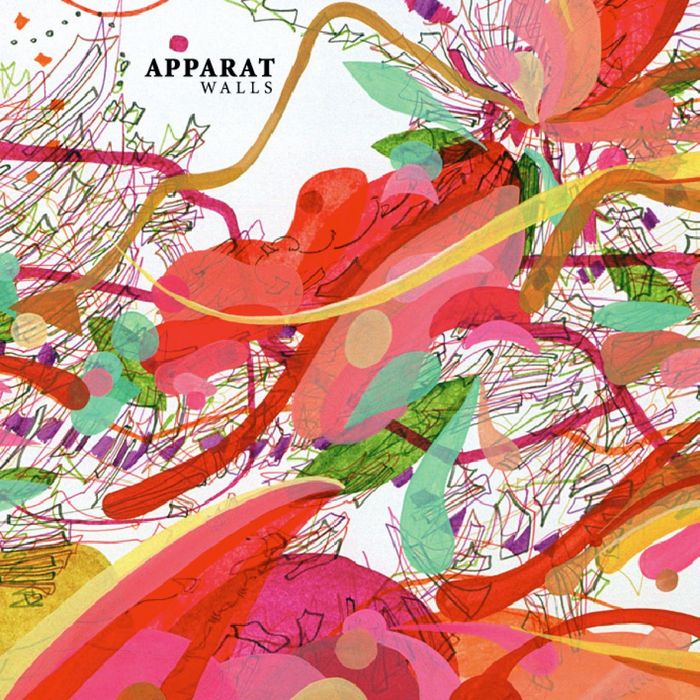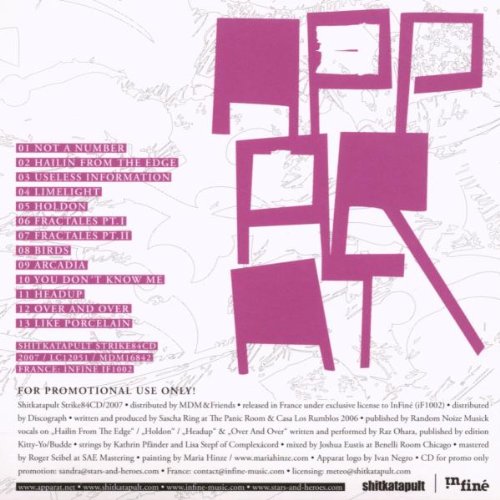

Apparat
Walls
Bpitch Control; 2007
By Nitsuh Abebe; August 7, 2007
It’s not really transparent to me, whatever logic dictates which electronic acts will become crossover favorites and which ones won’t. Just like with rock bands, there are always plenty of artists with sounds accessible enough for broad appeal– it’s just impossible to guess what arcane combination of style, timing, marketing, magic, and luck will actually send one into people’s attention.
Whatever the secret is, Berlin’s Sascha Ring, aka Apparat, seems to be aiming for it. The weird thing is, though, that he seems a much more likely candidate when he’s not trying. In and around the few dutiful pop tracks on Walls, his third full-length, Ring has made one of the best electronic dream-pop records in a while, somewhere in the tradition of M83, Slowdive, Junior Boys, Schneider TM, and every other act to trip out on dense, blissy echoes and thinky, under-the-covers slowness– not the kind of album that asks for your attention, but the kind that seduces you into it.
For most of his career, Ring has been a favorite in a specialized niche: As a producer, he has a reputation as a digital-processing wizard. The guy can chew up drums into alien machines, stretch strings out into hazy pillows, and stitch the resulting parts together in space like a dream; it’s made him a hero to that cognoscenti that’s less interested in the actual dancefloor and more interested in the sophistication of the techniques behind it. And on last year’s Orchestra of Bubbles, Ring shared billing with Ellen Allien, an artist with enough name recognition– and enough of a pop sensibility– to introduce his work to a lot of new headphones.
Walls is certainly trying to follow up that line: There’s a lot of the same seamless blending of electronic notions and pop ones, with small bits of production genius gathering themselves up into big, melodic, vocal-friendly sweeps. Thing is, Ring doesn’t actually seem suited for the kind of pop that, you know, pops: His style is too subtle, too relaxed, too head-in-the-clouds. His collaborations with Allien would always veer back to some kind of big, gritty thump– on his own, Ring stays gentle and dreamy, too lost in the rich stew of his sounds to ever grab you by the throat and demand attention.
So it’s the squinty-eyed pop tracks toward the beginning that don’t entirely hold up. “Hailin’ from the Edge” and “Holdon” both sound good on first listen, Ring setting up muted, futuristic r&b thumps and clicks behind pop vocals from Raz Ohara– a few times through, though, and you can sense a self-consciousness in them, a certain awkwardness. Push through to tracks like the two-part “Fractales” and the gorgeous “Arcadia”, and you feel like you’re getting into the territory where Ring would rather be: The sound of a guy who’s gone just a little tired out on dance music, who’s as interested in string quartets as kick drums, who just wants to escape to the studio and stretch sounds out into blurry clouds and the hiss of escaping steam.
You hit “Arcadia”, in fact, and this turns into a dream-pop triumph. “Arcadia” might start out with a mechanical, Allien-esque beat, but Ring uses it to push little wisps of synth around like watercolors, while a falsetto vocal glides and wanders through. On “You Don’t Know Me”, he does the same with strings, shepherding them through tight harmonic changes and up into a grand, stately climax. “Headup” has him singing softly against an ocean of reverberating voices that seems like a direct nod to the shoegazer band Slowdive– even before a spacy guitar line comes in to punctuate the changes.
It’s a shame Ring didn’t set out to construct his entire record along these lines, because they’re where he finds his greatest successes; the urge to strike while the pop iron is still hot may have painted him into a few strange corners. But as a path to follow after Orchestra of Bubbles– a path for listeners even more than for Ring– this is a terrific one: The best of these tracks combine the mechanized pulse and sonic possibilities of techno with good old bliss-out dreams better than anything in a while.
